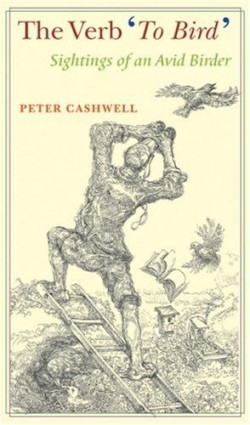It looks like you've stumbled upon a page meant to be read by our code instead of viewed directly. You're probably looking for this page.
The Verb 'To Bird'
Sightings of an Avid Birder
The house sparrow, Passer domesticus, the familiar sooty little brown city bird, is not a sparrow at all, but a weaver finch from Europe that was released in the United States with all the wrong intentions. In this book, the author regales readers with many historic side trips of the birds of the United States, including some significant excursions.
Not even the subtitle begins to describe the mosquito-infested treks that propel Cashwell from casual by-stander to rabid witness of the festival of colors represented by the feathered life. Some of that life keeps its distance, so visits must be made to uncomfortable habitats to see the less social. “Coated in wet grass and smeared with swatted insects,” he writes, “I returned to the house.” What’s a little rain, freezing gales, or waiting hours when the chase is afoot to add to the life list?
A number of the birds discussed here, such as a painted bunting, are local only to the coastal Carolinas where the author is based, but the experiences described are universal. In an entertaining, humorous style, the author adds personal commentary to his serious treatment of information. A birder by chance, an English teacher by trade, Cashwell takes the reader from libraries to marshes to identify native birds, acknowledging that he is not a rugged outdoorsman: “I complain when I can’t get coffee in the morning, and I’ve camped only a few dozen times in my life.” He also offers good advice on how to get a turkey vulture out of the front-yard boxwood.
Divided into three sections, Birding, Birds, and Birded, the book follows the author’s growth from a novice birder with a simmering interest, to one passionate to see all the birds of North America. He possesses an insight that helps to explain the underlying dynamics that would make a sane person exit a warm bed to enter the predawn darkness of a cold winter morning, hoping to hear the call of an owl or, better yet, to see its silhouette against the breaking dawn. Birding becomes the pursuit of habitat and history. (How did the northern cardinal acquire its name? Not from the early Protestant settlers.)
For the fledgling or the experienced birder, this book carries the reader afield. A side effect of reading The Verb “To Bird” is a strong urge to place binoculars around the neck and go sauntering across the fields into neighborhoods of friends never visited, and knowing that Cashwell would be a welcomed companion.
Reviewed by
David Zimmerman
Disclosure: This article is not an endorsement, but a review. The publisher of this book provided free copies of the book to have their book reviewed by a professional reviewer. No fee was paid by the publisher for this review. Foreword Reviews only recommends books that we love. Foreword Magazine, Inc. is disclosing this in accordance with the Federal Trade Commission’s 16 CFR, Part 255.
